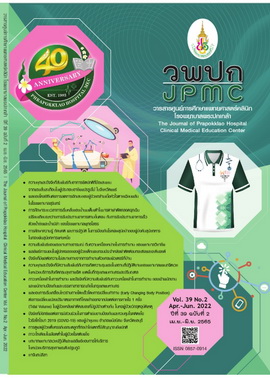The Effects of Colchicine on Inflammation Reduction in Patients with Acute Myocardial Infarction in Surin Hospital
Main Article Content
Abstract
BACKGROUND: In patients with acute myocardial infarction (AMI) receiving reperfusion therapy and the standard treatment for myocardial infarction, persistent elevated C-reactive protein (CRP) indicating high inflammation in the body can cause a high recurrence of cardiovascular diseases in the future. Colchicine is an anti-inflammatory drug, which has data confirming that it can reduce the incidence of cardiovascular diseases in patients with coronary artery disease (CAD).
OBJECTIVE: To study the effects of the inflammation reduction of 0.6 mg of colchicine in patients with AMI with primary percutaneous coronary intervention (PPCI) by focusing on hs-Trop I, CKMB, and CRP as the major results, whereas the left ventricular ejection fraction (LVEF) and side effects of the drugs would be the secondary results.
METHODS: The study consisted of 44 patients aged between 18-80 years diagnosed with AMI and successful PPCI in Surin Hospital, Surin, Thailand. They were randomized into two groups. The first group received a daily dosage of 0.6 mg of colchicine, and the second group received a placebo. Both received the drugs for 14 days. All patients were treated in accordance with the standard treatment for myocardial infarction. The differences of hs-Trop I, CKMB, CRP, and the left ventricular ejection fraction were observed, along with the side effects of colchicine and the placebo at the end of the study.
RESULTS: When comparing 0.6mg of colchicine with the placebo given to the patients, no difference was found from the primary data in both groups, i.e., age, sex, and risk factors; such as, diabetes, hypertension, smoking, and side effects from the drugs. Furthermore, no difference of hs-Trop I was found from the start of the study, day 1, 2, 3, 4, and day 14 (p=0.15, 0.11, 0.96, 0.71, 0.46, and 0.23, respectively), CKMB (p=0.65, 0.91, 0.41, 0.58, and 0.66, respectively), and CRP (p=0.86, 0.97, 0.75, 0.53, 0.67, and 0.52, respectively). There was also no difference of the left ventricular ejection fraction found on Day 1 and Day 14 as well (p=0.78 and 0.67).
CONCLUSIONS: According to the study, the inflammatory response of colchicine in patients with AMI did not show any inflammation reduction when compared with the placebo.
Thaiclinicaltrials.org number, TCTR20210127002
Article Details

This work is licensed under a Creative Commons Attribution-NonCommercial-NoDerivatives 4.0 International License.
References
Moreira DM, da Silva RL, Vieira JL, Fattah T, Lueneberg ME, Gottschall CA. Role of vascular inflammation in coronary artery disease: potential of anti- inflammatory drugs in the prevention of atherothrombosis. Inflammation and anti-inflammatory drugs in coronary artery disease. Am J Cardiovasc Drugs 2015;15:1-11.
Ridker PM, Everett BM, Thuren T, MacFadyen JG, Chang WH, Ballantyne C, et al. antiinflammatory therapy with canakinumab for atherosclerotic Disease. N Engl J Med 2017; 377:1119-31.
Ridker PM, Everett BM, Pradhan A, MacFadyen JG, Solomon DH, Zaharris E, et al. Low-Dose methotrexate for the prevention of atherosclerotic events. N Engl J Med 2019 ;380:752-62.
Deftereos S, Giannopoulos G, Papoutsidakis N, Panagopoulou V, Kossyvakis C, Raisakis K, et al. Colchicine and the heart: pushing the envelope. J Am Coll Cardiol 2013;62:1817-25.
Nidorf SM, Fiolet ATL, Mosterd A, Eikelboom JW, Schut A, Opstal TSJ, et al. Colchicine in patients with chronic coronary disease. N Engl J Med 2020; 383:1838-47.
Ajala ON, Everett BM. Targeting inflammation to reduce residual cardiovascular risk. Curr Atheroscler Rep [Internet].2020 [cited 2021 Nov11];22(11):66. Avalilable from: https://doi.org/10.1007/s11883-020-00883-3
Deftereos S, Giannopoulos G, Angelidis C, Alexopoulos N, Filippatos G, Papoutsidakis N, et al. Anti-Inflammatory treatment with colchicine in acute myocardial infarction: a pilot study. Circulation 2015;132:1395-403.
Akodad M, Lattuca B, Nagot N, Georgescu V, Buisson M, Cristol JP, et al. COLIN trial: Value of colchicine in the treatment of patients with acute myocardial infarction and inflammatory response. Arch Cardiovasc Dis 2017;110:395-402.
Hennessy T, Soh L, Bowman M, Kurup R, Schultz C, Patel S, et al. The Low dose colchicine after myocardial infarction (LoDoCo MI) study: a pilot randomized placebo controlled trial of colchicine following acute myocardial infarction. Am Heart J 2019;215:62-9.
Tardif JC, Kouz S, Waters DD, Bertrand OF, Diaz R, Maggioni AP, et al. Efficacy and safety of low-dose colchicine after myocardial infarction. N Engl J Med 2019 26;381:2497-505.
Mehta A, Mahtta D, Gulati M, Sperling LS, Blumenthal RS, Virani SS. Cardiovascular disease prevention in focus: highlights from the 2019 American Heart Association Scientific Sessions. Curr Atheroscler Rep [Internet]. 2020[cited 2021 Nov 11];22(1):3. Available from: https://doi.org/10.1007/s11883-020-0822-6
Samuel M, Tardif JC, Khairy P, Roubille F, Waters DD, Grégoire JC, et al. Cost-effectiveness of low-dose colchicine after myocardial infarction in the Colchicine Cardiova scular Outcomes Trial (COLCOT). Eur Heart J Qual Care Clin Outcomes 2021;7:486-95.

